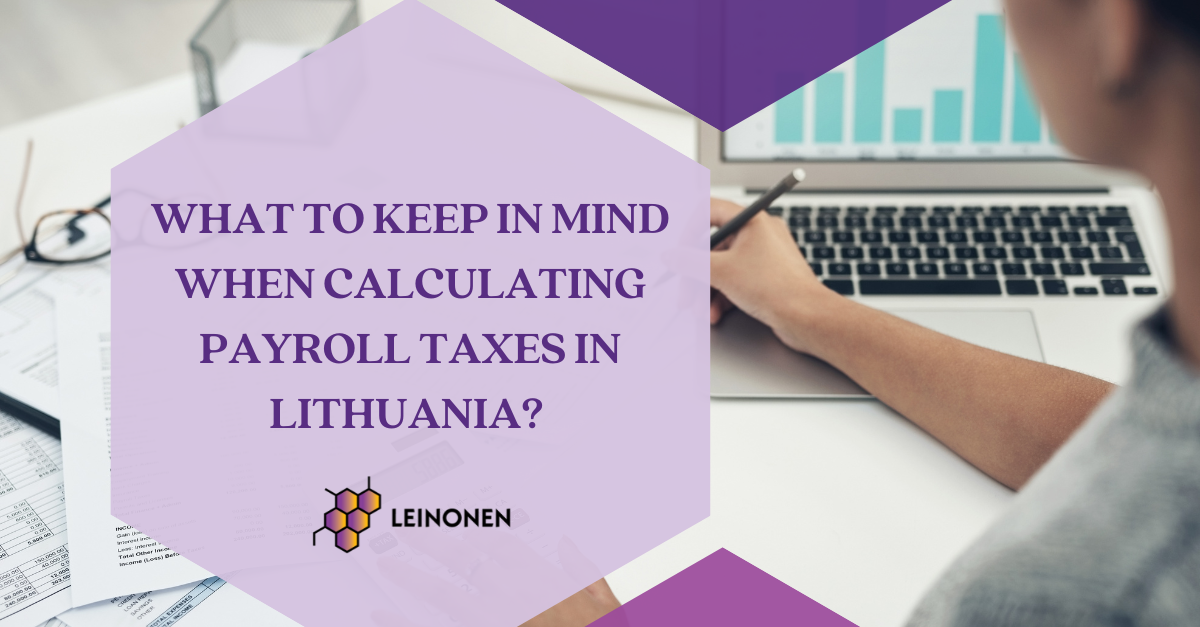Payroll taxes in Lithuania play a significant role in regulating the remuneration of employees. The Labor Code of the Republic of Lithuania provides guidelines for the organization of work remuneration, payment for overtime and night work, payment for work during rest days and holidays, payment for idle time, and other remuneration guarantees. Additionally, it outlines the determination of the minimum wage.
In Lithuania, payroll taxes consist of several components, including the progressive personal income tax, employee’s social security contributions, employer’s social security contributions, and voluntary participation of employees in the pension scheme. The remuneration of employees who work in companies, institutions and organizations under employment contracts is regulated in accordance with the Labor Code of the Republic of Lithuania.
PAYROLL TAXES INCLUDE:
- Progressive personal income tax – 20%/32% (when yearly limit of 60 average salaries income is reached, 32% rate applies from the exceeding amount).
- Employee’s social security contributions – 19,5% (pension – 8,72%, sickness – 1,99%, maternity – 1,81%, health – 6,98%)
- Voluntarily participation of employee in pension scheme – 3% (an employee who participates in accumulation and pays 3% to pension funds)
- Social security contributions paid by the employer – 1,61%-2,49% (depending on the entity and if employment contract is indefinite or fixed term). Please note that in rare cases when the companies are deemed as more prone to professional diseases (e.g. construction companies, specific factories and etc.) the rate could be up to 3,75% by a separate Social security fund order.
Income tax must be paid by those who receive income: residents of Lithuania and non-residents of Lithuania, which must pay income tax on income sourced in Lithuania.
Depending on the gross salary amount the following non-taxable amounts (NPD) are applied for Lithuanian tax residents:
- gross salary amount is equal or less to 840 EUR (minimum salary) – non-taxable amount is 625 EUR.
- gross salary amount is more than 840 EUR but less than 1926 EUR – non-taxable amount is calculated according to the following formula: 625 – 0,42 × (Gross salary – 840);
- gross salary amount is more than 1926 EUR but less than 2 864,22 EUR – non-taxable amount is calculated according to the following formula: 400 – 0,18 × (Gross salary – 642);
- gross salary is above 2 864,22 EUR – all amount is taxed.
Tax residents with limited working capacity are eligible for individual non-taxable amounts, depending on their level of working capacity. The following individual non-taxable amounts are applied for Lithuanian tax residents having a limited working capacity:
- 1 005 EUR in case the working capacity is 0-25%;
- 935 EUR in case the working capacity is 30-55%.
THE SOCIAL SECURITY CONTRIBUTIONS “FLOOR”
Companies must pay social security contributions for part-time employees whose monthly salary is lower than the minimum monthly salary from gross amount of 840 EUR.
There are the following exemptions of the social security contributions “floor”:
- the employee is employed by another employer in Lithuania;
- the employee receives a state pension for old age or lost capacity (disability) pension;
- the employee is not older than 24 years;
- the employee has 0-55% working capacity;
- the employee receives maternity, paternity, parental leave benefits.
THE SOCIAL SECURITY CONTRIBUTIONS “CEILINGS”
If during year employment income from all employee‘s employers exceeds 60 average monthly salaries, social security contributions “ceilings” become applicable. In this case for the employee only a rate of 6,98% (compulsory health insurance contributions) would be applicable for exceeded value. Regarding social security contributions paid by the employer, the rate remains the same (1,61%-2,49%).
WHAT IS THE TOTAL COST OF THE EMPLOYEE?
Employer must pay agreed gross salary and additional social security tax of 1,61%-2,49% (or by exception up to 3,75%), depending on if it is Lithuanian or foreign entity and if the employee contract is of indefinite or definite duration. 1,77% tax rate is applied if employment contract is of indefinite duration. 2,49% tax rate is applied if the employment contract is of definite duration. 1,61% tax rate is applied for foreign enterprises if employment contract is of indefinite duration. 2,33% tax rate is applied for foreign enterprises if employment contract is of definite duration.
If we come to the question of minimum salary, then this is set in Lithuania at 840 EUR per month, with a minimum hourly rate of 5.14 EUR since 1st January 2023. This ensures a baseline for fair compensation for employees across different industries.
In case of overtime, it is permitted under the exceptional cases which are listed in the Lithuanian Labour Code. Overtime work shall not exceed 8 hours for each employee in one week. Upon the written consent of the employee, overtime can be extended up to 12 hours per week.
Overtime hours are paid at an overtime compensation rate. It should be at least 1,5 of the employee’s regular hourly pay rate. For overtime work on a day off, which is not determined according to the work (shift) schedule, or overtime work at night, no less than double the employee’s salary is paid, and for overtime work on a public holiday – no less than 2,5 times the employee’s salary. At the employee’s request, overtime, multiplied by the corresponding rate (1,5; 2 or 2,5), may be added to the annual vacation time.
Summary workload is also an option, especially for companies that have changing work schedules, longer work hours (for example shops, restaurants, customer support centers, manufacturing companies). The summary workload period can be set up to 3 months long. At the end of the period, it is calculated if the employees have worked overtime or if the working time norm has not been fulfilled. In case of overtime, it is paid 1,5 rate at the end of summary period (or it may be added to the annual vacation time). If employees have not worked enough hours according to their contract, this time is paid at 0,5 rate.
When it comes to public holidays, according to Lithuanian laws, employees have the right to refuse to work during a public holiday. Exceptions apply if you are employed on irregular working hours or your union has signed a collective agreement, allowing work on public holidays. All employees must be paid at least twice their salary for their work during public holidays, regardless of their employment contract. At the request of the employee, the time spent working on rest days or public holidays or overtime hours multiplied by the appropriate rate laid down in the Labour Code may be added to the annual leave time. Employees who are pregnant or have recently given birth may only be assigned to work during public holidays, as well as for night shifts, with their consent.
MAIN EMPLOYEE BENEFITS AND TAXATION
Employers in Lithuania have the option to provide additional benefits to their employees, such as gym memberships, health insurance, education expenses paid directly to educational institutions, and public transport compensation for commuting to work. These benefits may be exempt from personal income tax and social security taxes if they meet certain conditions outlined in the Law of the Republic of Lithuania on Personal Income Tax.
Non-taxable benefits:
- Additional health insurance. The most popular supplementary employee benefit in Lithuania is voluntary Health insurance. Supplemental plans typically offer free annual check-ups, dental care and vision aids. If the health insurance plan meets the conditions set in The Law of the Republic of Lithuania on Personal Income Tax, it could be exempted from personal income tax and social security taxes, thus it is a great way to use company’s resources to the highest employee benefit.
- Payments to pension funds. The pension system in Lithuania comprises 3 pillars. The first one is mandatory for both employers and employees. The second one is optional and applicable to employees only, including a contribution from the government. The third one is an optional pillar for companies to make additional contributions. Employers who made additional contributions to employees’ pension funds can deduct such an expense from their corporate income tax if certain conditions are met. If the pension fund agreement meets the conditions set in The Law of the Republic of Lithuania on Personal Income Tax, it could be exempted from personal income tax and social security taxes.
- Education. Amounts for employee’s education paid directly to educational institutions.
- Small value gifts and prizes received from employer (not exceeding 200 EUR per year)
- Public transport compensation. Benefit received by an employee when an employer pays for rail and road public transport tickets which are used to travel to and from work.
- Remote work compensations. The employer can compensate the expenses incurred by the employee in connection with work, the purchase, installation, and use of work equipment, if the employee works under a remote work contract. Such compensations are not subject to personal income tax, but they will need to be supported by documents. The procedure for such compensation must be described in the company’s internal rules.
- Benefits paid to employees upon the death of their spouse, children, or parents. It is tax-free if the amount does not exceed 5 minimum wages.
Other benefits include:
- Additional special days off for sickness, birthdays etc., shorter work hours and flexibility – these are benefits usually added by employers’ initiative according to internal rules, which have been highly valued by employees lately. For such additional days off, employees usually receive either a full salary or average salary, which is taxable with all payroll taxes.
- Remote work – a lot of companies in Lithuania are now offering remote work possibilities, which are usually set by internal rules in the company.
- Additional vacation days. According to the Labour Code, employees who work in one company for longer than 10 years are entitled to additional vacation time. This encourages long term employment relationships, but a lot of companies choose to introduce additional days even earlier and according to their own internal rules.
- Sales incentives, bonuses for monthly, quarterly, or annual results, one-time bonuses – all such bonuses are considered a part of salary and are taxed with all payroll taxes.
- Daily Travel Allowances – if employees are traveling for business purposes, according to Labour Law they are entitled to receive daily allowances (also called per diems). There are set amounts for each country, approved by the Government. Unless employee’s salary is lower than the minimum salary multiplied by 1,65 coefficient, and these per diems exceeds 50% limits or the set amounts for each country, they are non-taxable.
- Internal and external work-related training for employees (these are considered normal business expenses and in most cases not considered benefit in kind).
Any other extra benefits are considered as benefit in kind. Benefit in kind is taxed as employment income. Most common extra benefits are:
- Gym membership
- Use of company car for private purposes
- Discounts for company’s production/services
- Meals
- Gifts received from employer that exceed 200 EUR per year.
PROGRESSIVE PERSONAL INCOME TAX SYSTEM
Lithuania has a progressive personal income tax system with varying tax rates for different types of income. The rates range from 15% for certain benefits to 32% for annual income exceeding 60 average salaries. Main criteria for progressive personal income tax system are the following:
- 15% rate – Sickness benefits (including those paid by the employer), maternity and paternity leave, child-care leave, long-term employment benefits (regardless of the amount of annual income).
- 20% rate – annual income sourced from employment relations that does not exceed 60 average salaries (101 094 EUR for year 2023);
- 32% rate – annual income sourced from employment relations that exceeds 60 average salaries (101 094 EUR for year 2023)
Tax rates for other income:
- 15% rate – income from self-employment; income from distributions (dividends); income from profit shares and remuneration for service on the supervisory board or management board, loan committee; income from employers under copyright contracts; income from civil (service) contracts of small partnership managers
The main rule in Lithuania is that if the company grants employees better conditions (higher overtime rates, more days-off, shorter work time, remote work etc.) than the Labour Code sets – it is allowable.
In conclusion, payroll taxes in Lithuania play a significant role in regulating employee remuneration and ensuring social security contributions. The progressive personal income tax system, along with employee and employer social security contributions, help fund various social benefits and services provided to employees. Additionally, non-taxable benefits and extra benefits provided by employers can offer additional incentives and support for employees.
It is important for both employers and employees to understand and comply with the payroll tax regulations in order to ensure fair compensation and adherence to legal requirements in Lithuania.
Contact Leinonen for all your payroll management needs in Lithuania.





